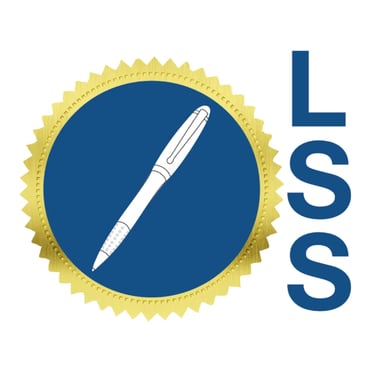Notarization vs. Witnessing - What’s the Difference?
GENERAL NOTARY WORK
Frank L Coxx
2/10/20256 min read


Many individuals often find themselves confused about the distinctions between notarization and witnessing when it comes to legal documents. Understanding the differences is crucial for ensuring your documents hold the validity required in legal matters. Both processes serve distinct purposes in the legal realm, impacting how your documents are accepted and utilized. In this post, you’ll learn the key differences between notarization and witnessing, allowing you to navigate these important aspects of document verification with confidence.
Understanding Notarization
While navigating legal documents, you may come across the term notarization. This process ensures that certain agreements are executed soundly, providing an extra layer of security and authenticity to your important papers. By engaging a notary, you can increase the credibility of your documentation and help prevent fraud.
Definition of Notarization
Notarization is a formal procedure whereby a notary public certifies the authenticity of a signature on a document. This process often includes verifying the identity of signers, ensuring they understand the contents of the document, and witnessing their signature to confirm their willingness to sign.
The Role of a Notary Public
Notary publics serve as impartial witnesses in various legal transactions, helping to deter fraud by verifying identities and ensuring that documents are signed willingly. They may also administer oaths and affirmations, allowing you to complete important legal procedures with confidence.
Another important aspect of a notary's role is to maintain a record of the notarizations they perform, often referred to as a notary journal. This log can provide valuable evidence in case any disputes arise regarding the authenticity of the signatures or the documents themselves, further enhancing the integrity of your transactions.
Understanding Witnessing
The process of witnessing involves individuals who observe the signing of documents to ensure that it is done willingly and with the intention to create a binding agreement. These witnesses can serve various purposes depending on the context, such as verifying identities or attesting to the authenticity of the signing process. To learn more about the different types of witnesses (and witnessing) Notaries may ..., you can explore various methods of documenting legal personal agreements.
Definition of Witnessing
Against common assumptions, witnessing does not always require formal qualifications or a specific profession. Instead, a witness is simply a person who lends their presence to the signing of a document, affirming that they observed the signature and can attest to the circumstances surrounding it.
The Role of a Witness
About witnessing, your responsibilities as a witness include verifying that the signer understands the document, is of sound mind, and is not under duress. Additionally, you may be required to provide your signature on the document, indicating that you have observed the signing process.
Hence, the witness adds an extra layer of trust and legitimacy to the document, reinforcing its validity. Your role is fundamental in legal settings because it helps prevent potential disputes regarding the authenticity of the signatures and the intent of the parties involved. By fulfilling the witness role, you contribute to a more transparent and reliable document-signing process.
Key Differences Between Notarization and Witnessing
You might be surprised to learn that notarization and witnessing serve distinct purposes in the legal realm. Notarization involves a notary public verifying your identity and the authenticity of your signature, while witnessing means having another party observe you sign a document. Notarization generally provides a higher level of legal assurance, while witnessing is often simpler and more straightforward.
Legal Implications
Between notarization and witnessing, the legal implications can vary significantly. Notarized documents generally carry more weight in court, as they are backed by a notary's seal and acknowledgment of the signer's identity. This can help prevent fraud and ensure the document's validity, whereas witnessed documents may not provide the same level of legal security.
Requirement for Documents
To effectively utilize notarization or witnessing, it's important to understand the specific requirements for each. Notarization typically requires you to appear in person before a notary public, provide valid identification, and sign the document in their presence. In contrast, witnessing usually requires the witness to be present at the signing, but they don’t need any special credentials.
In addition, notarization often involves specific forms and procedures that vary by jurisdiction, must be completed accurately to ensure legal standing. Witnesses, however, are usually not required to maintain any records of the signing, making the process of witnessing less formal. Depending on the document and its intended use, you might need to consider these distinctions when deciding which method to employ.
Situations Requiring Notarization
Once again, notarization plays an important role in various legal and financial transactions. You may find yourself needing a notary when signing contracts, real estate documents, or loan agreements. Additionally, if you're preparing some forms for court or requiring identity verification for sensitive transactions, notarization is often a vital step to ensure all parties are protected and that the documents are valid and enforceable.
Common Documents That Need Notarization
One of the most frequently notarized documents includes powers of attorney, which grants someone the authority to act on your behalf. You may also encounter various types of affidavits, loan documents, and deeds that necessitate notarization. The importance of having these documents properly notarized cannot be overstated, as they significantly enhance their legitimacy and can prevent potential disputes.
Benefits of Notarization
Behind every notarized document lies a layer of protection for you and the parties involved. Notarization helps to prevent fraud, ensuring that the person signing the document is who they claim to be and is signing willingly. It adds an official element of credibility and can also expedite various processes by reducing the need for additional verification steps.
Common advantages of notarization include increased trust from the involved parties, as notarized documents are often considered more reliable. By ensuring that your documents are notarized, you can minimize the potential for misunderstandings or disputes that may arise later. This added layer of security can ultimately save you time, money, and legal complications in the future.
Situations Requiring Witnessing
Not all documents need notarization; some simply require a witness. Typically, witnessing is necessary when signatures need verification to ensure that the signers are who they claim to be and are signing voluntarily. Situations such as executing a will, signing a property deed, or creating an advanced healthcare directive often mandate the presence of witnesses to safeguard against potential disputes or fraud.
Common Documents That Need Witnessing
Around many legal and financial documents, you may find a requirement for witnesses. Common documents include wills, trusts, powers of attorney, and certain types of contracts. Each of these documents benefits from having impartial witnesses present to attest to the authenticity of the signatures, reinforcing their validity in case of disputes.
Benefits of Witnessing
Behind the act of witnessing lies a layer of protection and assurance. Witnessing acts as a safeguard, ensuring that individuals signing documents do so voluntarily and are of sound mind. This practice adds legal weight to your agreements and can deter potential challenges regarding the validity of your documents.
This added layer of validation helps solidify your intentions and protects you from future legal complications. With witnesses present, you gain peace of mind knowing that your documents are more likely to hold up in court if ever challenged. By utilizing witnessing, you enhance the security and credibility of your important legal documents, ensuring they reflect your genuine intent.
Best Practices
All parties should clearly understand the distinctions between notarization and witnessing before proceeding. It's advisable to refer to resources like Does Your Document Require a Witness, Notarization, or ... to discern what is needed for your specific documents. Ensuring that you follow the correct procedure will not only expedite the process but can also prevent future challenges regarding the validity of your documents.
When to Choose Notarization
Behind many significant transactions lies the need for notarization to verify identities and ensure the authenticity of signatures. If you are involved in legal matters such as real estate transactions or wills, opting for notarization provides an additional layer of protection against fraud, as a notary acts as an impartial witness.
When to Choose Witnessing
When dealing with documents that require the attestation of a third party but are not legally mandated to be notarized, you may find that witnessing suffices. It is beneficial in circumstances like personal contracts or agreements where both parties trust the witness to affirm the document's execution.
Further, having a witness can foster transparency and trust among parties involved. It is advisable to choose a witness who is impartial and not a party to the agreement, ensuring that their testimony regarding the signing is unbiased. This practice can serve as a safeguard for all involved, providing reassurance that the document reflects your true intent.
Summing up
Taking this into account, understanding the differences between notarization and witnessing is important for ensuring the validity of your important documents. Notarization involves a neutral third party verifying your identity and the authenticity of your signature, while witnessing typically requires another individual observing you sign a document, confirming your agreement without any certification process. Knowing when to use each can help you safeguard your legal rights and streamline your transactions, giving you peace of mind in your personal and professional affairs.


